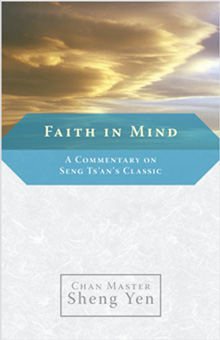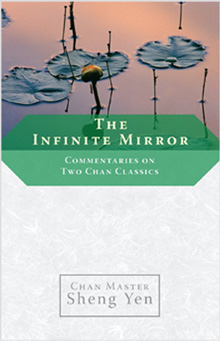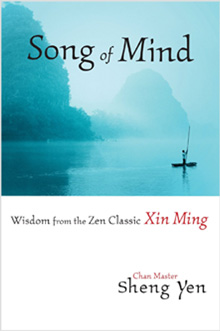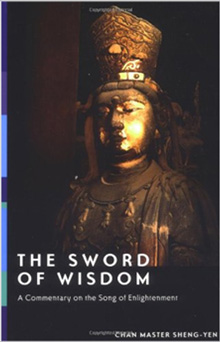CHAN MASTER'S DISCOURSE

Faith in Mind
In Faith in Mind Chan Master Sheng Yen (b. 1930)
comments on the revered Chinese Buddhist text, the
Xinxin Ming (Faith in Mind), by the third patriarch of
Chan, Sengcan (d. 606 C.E.). Only a few pages long,
the Xinxin Ming expresses profoundest truths about
the enlightened mind. Master Sheng Yen approaches
this poem as more than philo-sophy; he also sees it as
a practical guide to meditation practice. He says, "True
faith in mind is the belief grounded in realization that
we have a fundamental, unmoving, and unchanging
mind. This mind is precisely buddha-mind".

The Infinite Mirror
Here is the inimitable Master Sheng Yen at his best,
illuminating the ancient texts of the Chinese Zen
tradition to show how wonderfully practical they really
are, even for us today. The texts, written by two of the
founders of the Ts’ao-tung sect of Chan Buddhism, are
poems entitled Inquiry into Matching Halves and Song
of the Precious Mirror Samadhi. Both emphasize the
Chan view that wisdom is not separate from vexation,
and both speak of the levels of awareness through
which one must pass on the way to realization. Both are
also works of Buddhist philosophy that can serve as
guides to spiritual practice for anyone.

Song of Mind:
Wisdom from the Zen classic Xin Ming
Wisdom from the Zen classic Xin Ming
"No words can explain enlightenment," says the
seventh-century Chan classic Xin Ming (Song of Mind)
by Chan Master Farong (594-657). Even so, this poem
wonderfully expresses what cannot be expressed in
words. In his commentary, Master Sheng Yen takes the
austere language of the Xin Ming and reveals to us its
still-vital inner meanings. But his ultimate purpose is
practical: to show us how to approach Chan meditation,
how to deal with problems arising in practice, and how
to integrate Chan into every aspect of one's life. The
book is based on a series of 7-day intensive Chan
retreats with Master Sheng Yen that took place over
several years. Each chapter consists of a commentary
by Master Sheng Yen on a section of the poem, thus
guiding us stanza-by-stanza through this classic of
Chan literature. The result is an intimate feeling of
being there as he brings this classic to life.

The Sword of Wisdom:
A Commentary on the Song of Enlightenment
A Commentary on the Song of Enlightenment
The Sword of Wisdom is an insightful commentary by
Chan Master Sheng Yen on the Song of Enlightenment,
a classic Chan poem by Master Yung-chia (618-907)
that speaks of the proper methods and attitudes of
Chan (Zen) practice. In the deepest sense, however,
the Song of Enlightenment is no less than a roadmap to
enlightenment. Yung-chia speaks of the thoroughly
enlightened person as someone who has "nothing to
learn and nothing to do". In his commentary to Yung-
Chia's poem, Master Sheng Yen explains to us what
that means and what a practitioner should do to attain
the freedom of mind that the poem celebrates.
Compiled from a series of lectures delivered during
intensive 7-day meditation retreats, Master Sheng Yen's
lucid commentary offers fresh insights into a timeless
philosophy that will benefit and inspire all those
interested in Buddhism.

